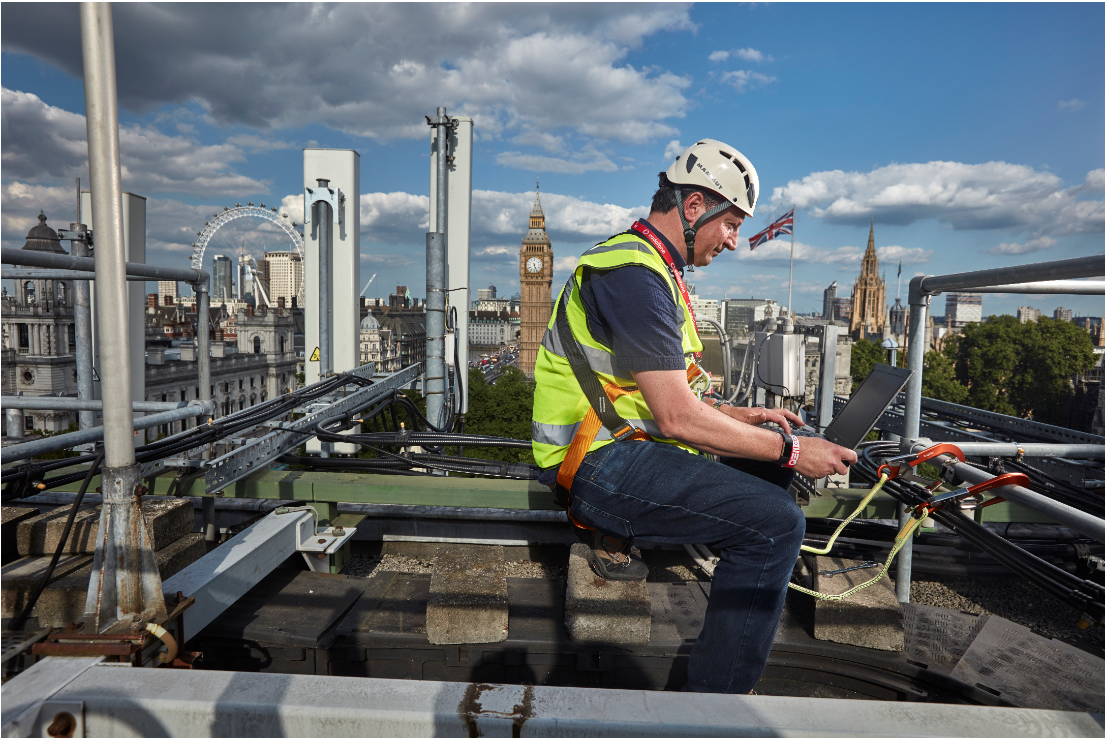
As Vodafone publishes a new report (click red Download button, above right), Nick Jeffery, CEO, Vodafone UK discusses how 5G could be the springboard the UK economy needs to recover from the coronavirus pandemic.
We don’t yet know what the full impact of this global coronavirus pandemic will be on the way we live, work and socialise.
But what I am certain of is this: we, as a nation, will come together and rebuild our local communities. We will work with Government to create the conditions for businesses to thrive once again. We will continue to support the needs of our health service and education systems. We will develop talent and ensure that the UK remains one of the most innovative and dynamic economies in the world.
The foundations for success will be based on rebuilding our local economies as quickly as possible. To achieve this requires a turbocharging of the Government’s stated ‘levelling up’ agenda. And 5G must be at the heart of this regeneration.
Full fibre is great and has its place, but nothing can compete with 5G in its ability to bridge the digital divide and reach those under-served parts of the country really quickly. It is the key to unleashing the full potential of every corner of the UK economy.
Powering growth
Because 5G isn’t just the next generation of mobile network technology, it’s a step-change in both speed and capacity.
Offering speeds up to 10 times faster than 4G and a huge boost to network capacity, the benefits will be felt right across the economy. ‘Digital super towns’ with super-fast connectivity provided by 5G mobile networks will power and grow tech start-ups specialising in artificial intelligence, virtual reality, robotics and other cutting-edge technologies.

Public services will be delivered to people in their homes at the touch of a button. Traditional industries, such as manufacturing, will be transformed, as Vodafone’s recent tie-up with Ford indicates.
Faster and more reliable mobile networks will lead to productivity gains and higher living standards for all. So it is essential to roll out 5G as quickly as possible to help businesses rebuild and respond to the changing demands of their customers in the post-Covid economy.
And we firmly believe that a high-quality education system – as well as high-quality digital infrastructure – must also be at the heart of plans to rebuild the nation.
Productivity boost
Our research, published in the report we’ve released today, highlights just how big these gains could be were businesses to move from 4G to 5G.
In the five years to 2025, cumulative benefits to UK output stand at more than £38bn, and for the five years to 2030, they stand at more than £120bn. Over 10 years, this means a productivity-based boost to UK output worth more than £150bn.

These benefits are also spread across each country and region of the UK. For example, the cumulative benefits to economic output in the North West in the five years to 2030 stand at £11.6bn, with £4.5bn in Greater Manchester alone.
Retailers are among those who are likely to gain first from new products and services driven by 5G. While technology and, in particular, the internet, have historically presented a threat to the high street, a wave of 5G-led innovation could make shopping more rewarding, interactive and exciting for consumers. This would also have the knock-on effect of improving brand loyalty and, ultimately, sales.

With our store re-openings, we’ve just shown how committed we are to reviving the UK high street. And the use of big data analytics is already helping retailers to understand shopping trends and tailor their services accordingly. 5G could supercharge this data-driven approach and ignite further innovation.
Global leader
The good news is that companies such as Vodafone are already committed to rolling out 5G networks across the UK. As a British company we want to work with our partners in local and national government to ensure the path is clear for us to continue to invest in improving the nation’s connectivity.
There has been much talk about the role of Huawei in all this. It remains a valued partner of ours, and we would happily continue that relationship. But whether we do or not is the UK government’s decision to make – we will respect and comply with whatever it decides. In the meantime, we continue to work closely with the Department for Digital, Culture, Media & Sport and the National Cyber Security Centre and we value their efforts.

We welcome the fact that the Government has recognised the importance of strong digital foundations and has committed the UK to becoming a global leader in 5G technology. It wants 5G to reach the majority of the country by 2027.
This is a commendable aim. But I believe we can and have to go further and faster.
Given the economic and societal benefits that 5G could play in unleashing a wave of new digital super towns with more job opportunities, reinvigorated high streets, more efficient businesses and better public services, I urge the Government to bring its ambition forward by two years.
If we can bring 5G to the majority of the UK population by 2025, then we will be going a long way to creating the conditions needed to rebuild the economy and the nation.
- Click here for the accompanying press release.




![Nicki-Lead_image[OPTIMISED]](https://www.vodafone.co.uk/newscentre/app/uploads/2023/10/Nicki-Lead_imageOPTIMISED.jpg)